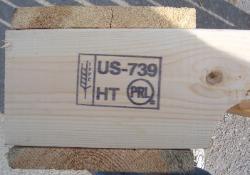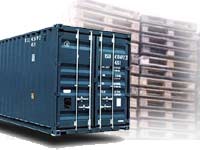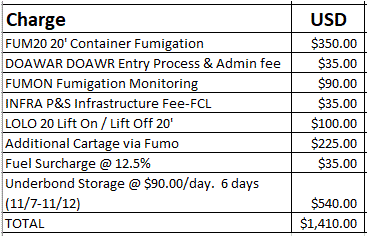Freight from the USA
|
|
|
|||
Since 2019, during BMSB seasons, from September 1st to April 30th of each year, carriers will not load freight to Oceania unless a valid fumigation certificate is provided. Otherwise, cargo can be fumigated at a carrier's facility. The standard treatment fee is approximately $30 per Cubic Meter (~35 Cubic Feet), with a minimum of $150-$300 per shipment, depending on the carrier.
The cost of the treatment is not included in quotes obtained with our online freight calculator and will be added to the sea freight carrier's international shipping cost.
If a shipper opts to fumigate with a carrier, the carrier's fumigation declaration, along with the treatment request, must be returned before the load is delivered to the sea carrier terminal (CFS). The fumigation declaration will be attached to our email with instructions.
If a shipment is scheduled to arrive in Australia or New Zealand during the BMSB season and the shipper does not provide a valid fumigation certificate or declines to fumigate their cargo with the carrier, we cannot process or ship the cargo.
International Standards for Phytosanitary Measures (ISPM 15) is the global standard concerning wooden packaging. It was introduced in March 2002 to eliminate the worldwide trade impediments caused by a complex web of import restrictions on wooden packaging. ISPM 15 stipulates, among other things, that wooden packaging must be treated to prevent the spread of vermin.
Wood-packing treated in accordance with ISPM requirements must be branded with the official IPPC mark. This mark cancels out the need for a phytosanitary certificate. If the wood does not comply with ISPM 15 standards upon arrival at the destination port, customs may confiscate, return, or destroy the cargo. Either the shipper or the consignee will be charged for these costs.

For international shipping from the U.S., unless you use raw wood in packaging or are exporting to countries of Oceania, the fumigation certificate is usually not a mandatory export document. However, as long as required, it assists in the quarantine clearance of imported goods upon arrival at the destination.
A certified fumigator should complete the treatment of exporting the commodity before departure. Unless a carrier accepts responsibility under ISPM 15, loads must comply with the regulations before being delivered to an ocean freight carrier's terminal (Container Freight Station - CFS).

A fumigation certificate, also known as a 'pest control certificate,' is used in global cargo transportation from the United States.
IT IS ESSENTIAL TO KNOW THAT A FUMIGATION CERTIFICATE MAY APPLY TO WOODEN PACKAGING ONLY OR THE ENTIRE CARGO.
1. Wood Packing Requirements
The treatment is only required for raw wood. Materials such as cardboard, plywood, plastic, and man-made wood (e.g., particleboard) should not be treated. These are processed at high heat and pressure, killing any pests.
Wood must be treated to prevent pests and branded with the IPPC stamp, which replaces the need for a phytosanitary certificate.
Certified ISPM 15-stamped wood is accepted. Due to ISPM 15 compliance, plastic pallets or crates are also widely used.
If packaging doesn't comply, customs may confiscate, return, or destroy cargo at the shipper's or consignee’s expense.
2. Cargo Fumigation
Countries like Australia and New Zealand may still require treatment of the entire shipment, especially for high-risk goods, regardless of the packaging being compliant.
Ocean freight carriers follow the guidelines of DAWR (Australia) and MPI (New Zealand) for BMSB treatment.
Shippers must consult with consignees or customs brokers to determine risk and compliance. The consignee is charged for non-compliance.
High-risk shipments must be treated before loading. If one item in a consolidated container is high-risk, the entire container is treated as high-risk.
Upon receiving a standard carrier's BMSB declaration form, shippers must:
In short, the BMSB regulation requires that all shipments deemed high-risk by DAWR and MPI standards be treated before loading from countries with high-risk origins. The USA is on the list. With consolidated freight, the rule states that if one shipment in the container is considered high-risk, the entire container is regarded as high-risk.
For this reason, ocean carriers will require that all shippers review the international shipping requirements to determine the risk associated with their shipment and determine whether the cargo requires fumigation. Ocean carriers will require a signed declaration from the shipper before considering any shipment for loading.
Typically, ocean carriers will be providing treatment for LCL at load ports and gateways, and the following measures will be in effect:

Australia and New Zealand are the most restricted countries. For more information, refer to the Australian Government Department of Agriculture and Water Resources website.
Timber-bearing insects pose a significant quarantine risk when shipping to Australia and New Zealand. Therefore, all timber used in FCL containers shipping from the USA, including the exposed timber components of the container itself, must be treated before the container can be considered for immediate release.
Quarantine concerns timber pests during international shipping and the cleanliness of sea freight containers.
All conditions prescribed by the quarantine and customs authorities for global transportation must be met before any freight can be removed from a terminal or breakbulk depot.
General
The following steps should be taken to ensure prompt delivery of goods shipping from the USA to Australia and New Zealand without detention by the Quarantine Authorities:
Whenever possible, containers are cleared through quarantine on documentation. Still, several are inspected at the importer's premises to verify this documentation. Where infringements of quarantine requirements are found, all subsequent consignments from that exporter may be directed to a depot for clearance. Apart from the delay and all the possible prejudice to subsequent shipments, all remedial action costs will be charged to the consignee.
From this web link, you may download and view an Australian Wood-packing declaration.
Containers carrying sea freight for delivery to approved break-bulk depots, where regular quarantine inspections can be undertaken, do not necessarily have to meet any special requirements. However, the treatment will be undertaken if an infestation is found in the wooden crates or cases. The cost to the exporter, in the form of treatment charges, delays, and inconvenience, may well outweigh the small additional costs of using treated timber when making up the crates and cases.
OTHER RESTRICTIONS ON CARGO CONTAINING WOOD-PACKING MATERIALS:
For your guidance, we would also draw your attention to the following additional restrictions on transporting goods from the USA to Australia and New Zealand:
(a) Treatment of household goods and personal effects will not permit the immediate release of containers. Containers carrying these goods must pass through an approved depot for unpacking, and the treatment of such assets is subject to quarantine.
(b) Containers must be free from soil, plant material, and contamination from animal products. The inside and outside of containers are thoroughly cleaned before shipment to remove contamination. This could alleviate the need for expensive and time-consuming quarantine treatments. All containers detected entering Australia and New Zealand are treated before release.
(c) Any material of plant origin or likely to carry any disease or pests of plants is subject to quarantine. International shipping of some items is prohibited except with a special permit. Containers of agricultural products originating from the UK and the NW Continent (now the Khapra beetle area) must be accompanied by a packer's certificate of container cleanliness before packing, a fumigation certificate for the empty container (not required if the container is not lined), and a phytosanitary certificate.
(d) Items such as motor vehicles or agricultural machinery contaminated with soil must be cleaned before release. Steam cleaning before shipment will ensure the freight is in an acceptable condition upon arrival, but this cannot be guaranteed.
(e) Phostoxin is the proprietary name for aluminum phosphide. It is applied in solid form, usually as tablets, and relies on a reaction with moisture in the air to release phosphine gas. Use is limited and commonly where a commodity is known to have an adverse reaction with methyl bromide. PLEASE NOTE: It can only be used as a commodity fumigant and is not an accepted timber treatment method for deliveries to Australia or New Zealand.
To ensure that no expensive delays happen to your cargo on arrival and to ensure that it is immediately released for onward movement into the country, we recommend that you take the following precautions:
(1) If using your own or leasing a container, ensure that its exposed timber components have been permanently treated to the Quarantine Authorities' requirements and that the container is registered with them. Otherwise, the containers must be fumigated within 21 days before use.
(2) Where possible, do not use any wood for pallets, packaging, dunnage, or securing materials if you can find suitable alternative arrangements not subject to quarantine regulations, for example, paper products, cardboard, plastic products, fibreboard, cardboard, metal, clean dry used motor tires, inflatable dunnage, wood-wool, and metal or plastic strapping. Chipboards, plywood, and particleboard are also suitable, provided they are new and manufactured in Canada, Europe, Israel, Japan, New Zealand, the UK, or the USA.
Limited timber products are not acceptable; neither are materials such as straw, rice hulls, or similar plant materials.
(3) Where wood is used for pallets, packaging, dunnage, or securing material, then it must meet quarantine requirements in one of two ways:
(i) Be permanently treated with approved preservatives such as copper-chromium-arsenic salts or copper-chromium-boron salts.
(ii) It must be temporarily disinfected using one of the approved methods below. Timber treated by one of these methods must be packed in a container or shipped within 21 days of the treatment date.
(a) Methyl Bromide fumigation
(b) Sulphuryl Fluoride (Vikane)
(c) Heat or kiln sterilization
(d) Steaming
(e) Immersion in a hot liquid
Further information may be obtained by consulting the following publications available from your local ACA Containers Office:
(a) Cargo Containers – Quarantine Aspects and Procedures. Australian Quarantine Service.
(b) Summary of Australian Plant and Animal Quarantine Requirements in international shipping. Australian Quarantine Service.
(c) Requirements for sea freight Containers and Containerised Cargo. Ministry of Agriculture and Fisheries. New Zealand Forest Service.
METHOD: METHYL BROMIDE FUMIGATION
Methyl bromide fumigation is the most practical and economical method for treating timber. Loaded containers may be fumigated to treat their exposed timber components, timber packaging, or cargo. ACA International can arrange for your container to be fumigated if you require this service or if your quarantine documents are not in order upon arrival of your cargo.
The treatment contractor must complete and sign a fumigation certificate for transportation to Australia or New Zealand. The contractor must comply with the ACOP (Approved Code of Practice) to control substances hazardous to health.
The shipper must complete the quarantine declaration section of the Export Cargo Instructions for coding on the manifest (IEF).
The shipper will forward certificates and declarations for importing timber treatment to the consignee with invoices or export documents.
Where treatment has been carried out by ACA International or their agent on behalf of the shipper, fumigation certificates will be forwarded centrally.
Words: 1
Characters: 14
|
|